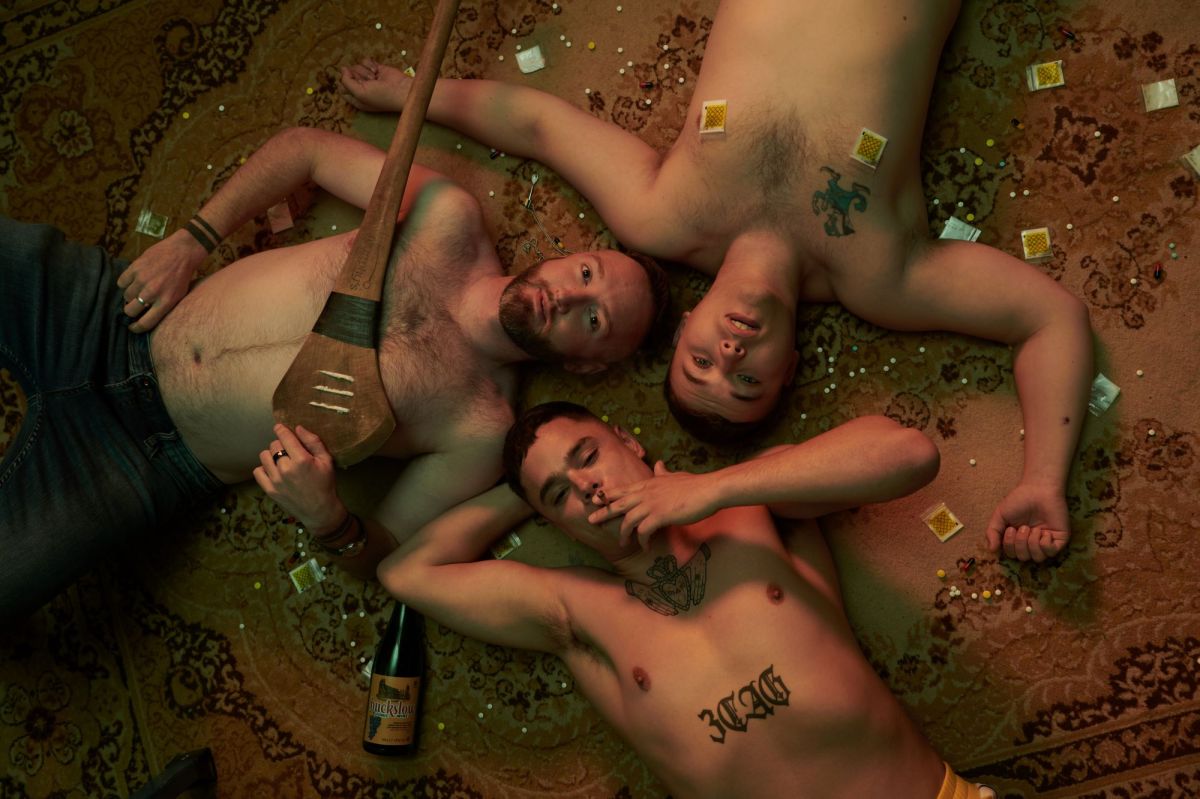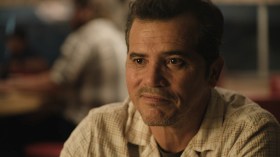‘Every word of Irish spoken is a bullet fired for Irish freedom,’ is the oft-repeated refrain in British director Rich Peppiatt’s debut feature film, Kneecap, a fictionalised biopic about the popular – some would say notorious – Irish hip hop trio of the same name.
Rapping as Gaeilge (in Irish) is a political statement for Kneecap; a defiant act of cultural reclamation in response to 700 years of British colonial oppression (including the introduction of a law banning the speaking of Irish under certain circumstances in 1367; the first of several such attempts to actively silence and repress the language).
Consequently, Kneecap the film, a bawdy, rambunctious, hedonistic and exhilarating take on the band’s formation and rise to fame, is not only a work of entertainment: it’s also a call to arms on behalf of endangered languages everywhere.
As Kneecap’s Naoise Ó Cairealláin (known on stage as Móglaí Bap) told this writer during a recent interview on Melbourne’s community radio station 3RRR: ‘We hope that this movie represents identity and people’s identities all around the world. Even though it’s based on the Irish identity, I think that resonates with people all around the world.
‘There are many colonised countries in the world who have nearly had their language wiped out or [where they] have been wiped out. So a big part of what we hope this movie achieves is that people will reflect inwards and think introspectively about their own culture and about their own identity.’
The protagonists of Kneecap are the three members of Kneecap themselves: Ó Cairealláin, one of the band’s two rappers; fellow frontman Liam Óg Ó Hannaidh (aka Mo Chara); and JJ Ó Dochartaigh (DJ Próvai), the schoolteacher turned hip hop artist who provides the band’s beats and backing tracks.
Each receives their own storyline in the film, with Ó Cairealláin’s being the most emotionally resonant as he attempts to reconnect with his absent father, former Republican paramilitary Arló Ó Cairealláin (Michael Fassbender), who faked his own death at sea in order to escape police attention, cutting himself off from his family in the process.
Ó Hannaidh’s story arc is primarily focused on the conflict he feels as a Republican who is only aroused sexually by Unionist women, while Ó Dochartaigh’s storyline – focusing on his relationship with his wife, Irish language activist Caitlin (Fionnuala Flaherty) and is growing dissatisfaction with his teaching career – is low key but impactful.
All three band members present well on screen, despite having no prior acting experience, but it is Ó Dochartaigh who most impresses with a subtle, nuanced, and wild-when-it-needs-to-be performance.
Two primary antagonists provide the film’s opposition: the hard-nosed Detective Ellis (Josie Walker) of the Police Service of Northern Ireland (PSNI), who will use any means necessary to prove that the missing Arló is still alive, and the members of paramilitary splinter group the Radical Republicans Against Drugs (RRAD), who violently object to Mo Chara and Móglaí Bap’s street-level drug dealing.
Spot the reference
RRAD’s presence in the film echoes Kneecap’s earlier works (including the opening track of their 2021 debut album 3CAG and a standalone track, ‘Gael Gigolos’, released the same year) while RRAD’s contempt for a similar gang of paramilitaries, the New Republicans Against Drugs, feels like a callback to the rivalry between the People’s Front of Judea and the Judean People’s Front (‘Splitters!’) in Monty Python’s Life of Brian.
Coupled with the clear influence of Trainspotting on the film, such overt referencing ensures Kneecap is scattered with an array of scenes and lines which collectively enrich its story and enhance its humour.
And while some such references (a brief cameo by former Sinn Féin president Gerry Adams among them) may fly over Australian audiences’ heads, there’s more than enough happening at surface level to ensure Kneecap remains an enjoyably drug-fuelled ride – complete with a gleefully chaotic scene depicting the once straight-laced DJ Próvai’s orgiastic introduction to mind-altering substances, as well as the occasional warning to remember exactly what it is you’re snorting before you rack up the lines, nor afterwards.
Kinetic cinematography and powerful music
Music is utilised skilfully throughout, adding additional energy to some scenes and emotional weight to others. The use of Orbital’s 1991 track ‘Belfast’ for instance, helps convey the determination felt by the chronically depressed Dolores Ó Cairealláin (Simone Kirby), when – fuelled by injustice after her son’s freshly-recorded track is dropped from airplay due to its ‘offensive’ lyrics – she finally leaves the house after years of isolation to seek community support, a sequence which could feel rushed or underdeveloped without the song providing an emotional shortcut for the scene.
Supporting characters such as Ó Hannaidh’s Unionist girlfriend Georgia (played with verve by Jessica Reynolds) sometimes lack depth and detail, but performances are strong throughout, with a scene between Kirby and Fassbender (in which Dolores accuses Arló of trapping his family in a metaphorical prison so that he could avoid prison in real life) being especially potent and poignant.
DOP Ryan Kernaghan’s camerawork is kinetic and compelling, aided by the fast-paced but never choppy editing of Chris Gill and Julian Ulrichs, while Stephen McCollum’s distinctive animation (which also features in the grim but gripping video for ‘The Granite Gaze‘ by another outstanding Irish band, Lankum) adds a suitably hallucinogenic tone to certain sequences.
Holding everything together is the directorial eye of Rich Peppiatt, who also wrote the screenplay based on a story written collaboratively with Kneecap’s three members. Peppiatt deftly handles the film’s tonal shifts from tense drama to comedy, and has an especially keen eye for the music sequences, which vividly capture the dynamic and passion of a live gig – even when underattended or the band are off their faces.
The collective decision to lightly fictionalise the band’s story (by inserting Ó Hannaidh into an early scene set at a police station, for instance, after an incident which inspired the band’s first single, despite Ó Hannaidh not actually being present at the time) further ensures Kneecap remains fluid, fast-paced and dynamic instead of falling into the pitfalls which often befall musical biopics – real life, after all, stubbornly refuses to conform to the tropes of a traditional three-act story structure.
A vibrant blend of comedy, music and drama, Kneecap is an exceptional showcase of the hip hop trio’s talents, and has already won numerous awards, including an Audience Award at the Sundance Film Festival and more recently, the awards for Best Irish Film, the Audience Award and the Irish Language Feature Film Award at the 36th Galway Film Fleadh, Ireland’s most prestigious film festival.
The film is now Ireland’s official entry to the Best International Feature category at the Oscars. Whether or not it will make the final awards shortlist remains to be seen, but one thing is already certain: Kneecap is a hell of a ride.
Kneecap screened as part of MIFF 2024 and is released in cinemas nationally on 29 August, distributed by Madman.
Actors:
Liam Óg Ó Hannaidh, Naoise Ó Cairealláin, JJ Ó Dochartaigh, Josie Walker, Fionnuala Flaherty
Director:
Rich Peppiatt
Format: Movie
Country: Ireland, UK
Release: 29 August 2024





